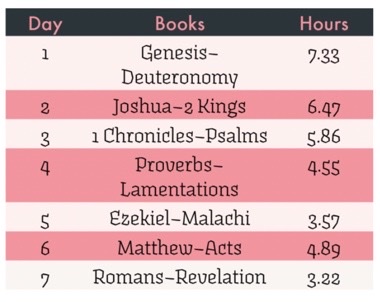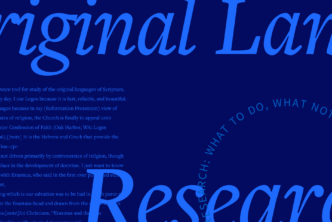Some learning curves are difficult to climb because the concepts involved run against the grain of the human mind (for some people, math). Sometimes there’s the challenge of where to start with intertwined concepts woven in a thick web, such as in philosophy. Or there can be the problem of whose story to believe, as in economics or public policy.
Bible study is challenging for similar reasons. But the core challenge is the one faced by the historiographer: it’s the problem of volume. How can anyone possibly learn, understand, and remember so much content? In fact, our physical editions of the Bible cloak this from us. Publishers use “Bible paper,” paper so thin it’s nearly translucent. If they didn’t, you’d be walking around with a box of books under your arm.
And because of the scale of this anthology we call the Bible, we struggle to mentally hold it all together. How does one keep Deuteronomy in mind while reading Romans? How can you remember the theology of James while reading Ecclesiastes? By the time we arrive at Revelation, we’ve completely forgotten about the Torah.
But there is a workable, albeit slightly crazy remedy to this problem—read the whole Bible quickly enough that you don’t have time to forget it. Gain the perspective of a high-speed, helicopter fly-over. I intend to persuade you to add something new to your life bucket list: you should consider binge-reading the Bible.
Binge-reading
I borrow my basic concept from binge-watching television series. In other words, set a ridiculous goal, a goal that seems a few steps beyond what’s reasonable or doable. Try to get through the entire Bible in as short a span as possible.
A pretty good entry level is to read through Scripture in three months. This will take about 30 minutes a day. Reading the Bible in a single month is another possibility. It may seem too formidable—and it will indeed take some planning. But most of us could find the extra 90 minutes a day just by eliminating other kinds of bingeing (social media and videos).
But for years I wanted to do the ultimate Bible binge: I wanted to read through the entirety of God’s word in a week.
Reading the Bible in a week
Before I go on, let me concede that I tried a one-week read more than once and failed. I also waited 5-6 years before I found the perfect window of opportunity. This involved Christmas break, getting ahead at work, taking a few extra days off, and an incredibly patient wife.

Let me give a few other practical pointers that made this binge possible for me:
- Read with pen in hand. I bought a cheap award Bible for under $5 and marked it up with blissful abandon. My lines weren’t straight; everything was a mess. But it didn’t matter because I was actively engaging with the text.
- Keep moving. There’s no time to stop and “check things out” during a Bible binge. If needed, mark the things you’re curious about and come back later. Your goal is to cover the ground quickly. You will need to discipline yourself not to get bogged down.
- Pace yourself. Think like a long-distance runner. At the beginning of each day, divide the total pages by how many hours you’re allotting and force yourself to stay on track. The same goes for the shape of the week. Finish the Pentateuch on day one while it’s still exhilarating. Expect to struggle most on days 3-4. But once you get over the hump, the New Testament on days 6-7 will fly by.
- Change it up. You can’t read for 5-6 hours a day lying on your back. Read while standing or while walking around. Or use an audio Bible on double-speed (though you should pair an audio Bible with marking a printed copy).
Scripture as a unified drama
Returns are usually commensurate with the cost of the investment we make. Reading the Bible in a week will cost you a lot, but that’s also a hint at its value. If your experience is like mine, binge-reading the Bible will change your life.
That’s because Scripture records the most dramatic story arc in the world. Many of us could summarize that story. But what compares to reading about creation on Sunday, Israel’s history on Monday and Tuesday, the warnings and exile on Wednesday and Thursday, Jesus’s coming on Friday, and the grand victory on Saturday?
Living through that drama in such a short time frame gives the Bible’s intentional contrasts their full richness. The law and Sinai bring you to despair at how anyone can approach a holy God—until Deuteronomy bolsters your hopes again. You want to scream at the insanity of sin as king after king destroys himself through disobedience. You weep with the prophets’ laments and wonder when people will ever have hearts ready to obey.
And then the Gospels open like daybreak coming over the hills. The epistles give a theological framework, not just for Jesus’s life and death, but also for the entire story up to that point. And because an entire Bible’s worth of allusions have percolated through your brain only days before, Revelation sings as it should—the myriad strands of the vibrant tapestry come together into one. At last, everything in heaven and earth is as it ought to be.
In fact, I contend that you cannot adequately appreciate how many internal connections (“intertextuality”) the Bible contains apart from an aggressive, rapid reading. No other body of literature can compare to the intertwined diversity and continuity of Scripture. It’s like a city with multiform strata, systems and grids, working together to create a vibrant, coherent whole. You want to walk along those streets, recognize the markers, and understand the layout. But to do so, you’ll need the entire map in your mind at a single glance.
How binge-reading changed me
I was already a pastor and a seminary professor for several years before I ever binge-read the Bible. Still, I look back at the experience as one that changed the trajectory of my life. I found answers to specific struggles and questions that had plagued me for more than a decade. Other passages that had always seemed odd came into full focus because I could mentally draw on the entire story of Scripture.
And most importantly, I was awe-struck by the beauty of this book in a way that I will never forget. God’s word is a wonder. I am grateful for a wide variety of apologetic arguments—corroborating lines of evidence that bolster my faith. I know of none so cogent or confirming as the existence of this extraordinarily diverse but coherent book. The Bible merits—no, it demands—your attention. It warrants your reading over and over again. And at some point, while you have life, you ought to enjoy the experience of reading it all in one week.
You will not remain unchanged.
***
This article was originally published in the November/December 2021 issue of Bible Study Magazine. Slight adjustments, such as title and subheadings, may be the addition of an editor.
Related articles
- Free Chronological Bible Reading Plan & How to Stay on Track
- 29 Bible Study Tools for Reading the Bible More Effectively
- Words of Life: 4 Reasons the Bible Stays Relevant
Related resources






